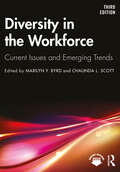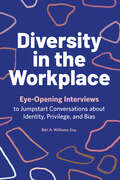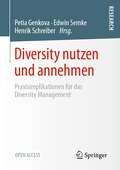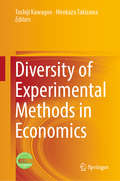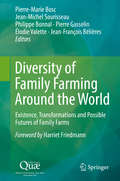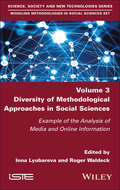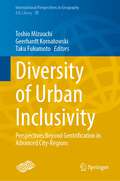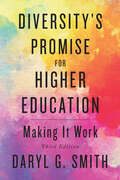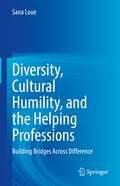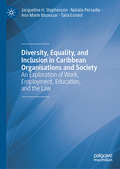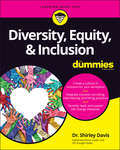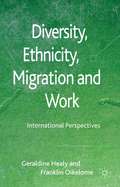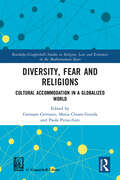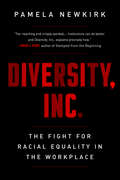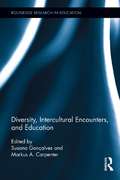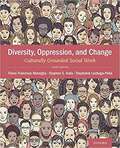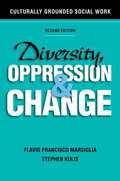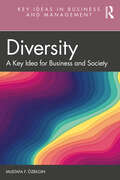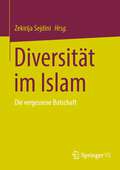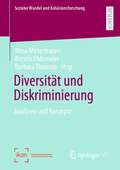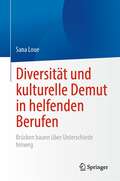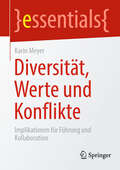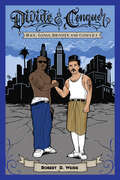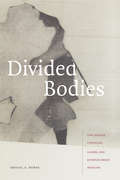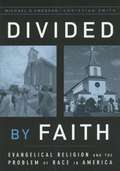- Table View
- List View
Diversity in the Workforce: Current Issues and Emerging Trends
by Edited by Marilyn Y. Byrd and Chaunda L. ScottThis comprehensive, integrated teaching resource provides students with the tools and methodologies they need to effectively negotiate the multiple dynamics that emerge from difference, and to appropriately respond to issues of marginalization and social injustice. Written from an American perspective, the book not only covers the traditional topics of race, gender, ethnicity, and social class, but explores emerging trends around ‘-isms’ (racism, sexism). Thoroughly revised and updated, this third edition includes new case studies and expanded coverage of topics such as social justice, microaggressions, and gender identities and expressions. End-of-chapter questions encourage students to engage in difficult conversations, and case studies stimulate students’ awareness of real-world issues that emerge from diversity, helping students to develop the broad range of skills they need to mediate or resolve diversity issues as future professionals. This edition includes updated Instructor Resources such as PowerPoint slides, multiple choice quizzes, and essay questions as well as additional links which can be found online.
Diversity in the Workplace: Eye-Opening Interviews to Jumpstart Conversations about Identity, Privilege, and Bias
by Bärí A. WilliamsContemporary and compassionate teachings for building true workplace diversity In order to create an inclusive working environment, it is important for companies to understand the experiences that diverse employees face in the workplace. Diversity in the Workplace is a guided tour of what it means to be a minority in today's labor force. Containing 25 real-life interviews, including stories of trailblazers fighting inequality, you'll be exposed to a slice of life you may not have been privy to. This book explores real world issues in a modern workday dynamic for members of marginalized communities and managers looking to equalize an imbalance. Diversity in the Workplace includes: Exploring intersectionality—Learn about the diversity identities shaping disparity at work: Race, Gender, LGBTQ+, Age & Ability, and Religion & Culture. Key takeaways—Each section is followed by summaries that encourage reflection and action. Deep dive—Learn tips on how to have progressive conversations with colleagues, and build awareness with key terms such as "unconscious bias." Move toward a more fair and bias-conscious future with Diversity in the Workplace.
Diversity nutzen und annehmen: Praxisimplikationen für das Diversity Management
by Petia Genkova Edwin Semke Henrik SchreiberDas Open-Access-Buch bietet einen umfassenden Überblick über relevante psychologische Konzepte des Diversity Managements. Das Buch stellt verschiedene Forschungsarbeiten vor, die Wechselwirkungen und Einflussvariablen von Diversity Bewusstsein, Einstellungen und Kompetenzen bei Personen mit und ohne Migrationshintergrund im Studium, bei Mitarbeitenden und bei Führungskräften untersuchen. Dabei wird ein Fokus auf die Diversitätsdimension Kultur und Kultureller Hintergrund gelegt. Aus den empirischen Ergebnissen werden Problemfelder abgeleitet sowie Risiken und Chancen für das Diversity Management in deutschen Unternehmen und Hochschulen aufgezeigt. Zentrale Stärke des Buches ist, dass insbesondere für die MINT-Branche, die eine hohe Relevanz für den Mittelstand am Wirtschaftsstandort Deutschland hat, konkrete Ergebnisse, Handlungsfelder und Empfehlungen präsentiert werden.
Diversity of Experimental Methods in Economics
by Toshiji Kawagoe Hirokazu TakizawaThis is the first book that examines the diverse range of experimental methods currently being used in the social sciences, gathering contributions by working economists engaged in experimentation, as well as by a political scientist, psychologists and philosophers of the social sciences. Until the mid-twentieth century, most economists believed that experiments in the economic sciences were impossible. But that’s hardly the case today, as evinced by the fact that Vernon Smith, an experimental economist, and Daniel Kahneman, a behavioral economist, won the Nobel Prize in Economics in 2002. However, the current use of experimental methods in economics is more diverse than is usually assumed. As the concept of experimentation underwent considerable abstraction throughout the twentieth century, the areas of the social sciences in which experiments are applied are expanding, creating renewed interest in, and multifaceted debates on, the way experimental methods are used. This book sheds new light on the diversity of experimental methodologies used in the social sciences. The topics covered include historical insights into the evolution of experimental methods; the necessary “performativity” of experiments, i.e., the dynamic interaction with the social contexts in which they are embedded; the application of causal inferences in the social sciences; a comparison of laboratory, field, and natural experiments; and the recent use of randomized controlled trials (RCTs) in development economics. Several chapters also deal with the latest heated debates, such as those concerning the use of the random lottery method in laboratory experiments.
Diversity of Family Farming Around the World: Existence, Transformations And Possible Futures Of Family Farms
by Jean-Michel Sourisseau Pierre-Marie Bosc Philippe Bonnal Pierre Gasselin Élodie Valette Jean-François BélièresThis book aims at explaining the nature and strength of the links between the families and their farms looking at their diversity throughout the world. To do so, it documents family farming diversity by using the sustainable rural livelihood (SRL) framework exploring their ability to adapt and transform to changing environments. In 18 case studies in Asia, Africa, Latin America and Europe, it shows how family farms resist under adverse conditions, seize new opportunities and permanently transform. Family farms, far from being backwards are potential solutions to face the current challenges and shape a new future for agriculture taking advantage of their local knowledge and capacity to cope with external constraints. Many coauthors of the book have both an empirical and theoretical experience of family farming in developed and developing countries and their related institutions. They specify «what makes and means family» in family farming and the diversity of their expertise draws a wide and original picture of this resilient way of farming throughout the world.
Diversity of Methodological Approaches in Social Sciences: Example of the Analysis of Media and Online Information
by Roger Waldeck Inna LyubarevaAs with many rapidly evolving areas, research on pluralism in media and information makes use of appropriate interdisciplinary approaches that consider diverse and interdependent factors. These considerations include new economic constraints, journalistic production, networked technologies, online social interactions, new forms of discourse, consumer preferences and practices, and the specificities of information markets. This book presents and assesses several methodological approaches that have proven to be valuable in the study of transformations in media and information. Some are well-known in social sciences (e.g. qualitative analysis by interviews), whereas others come from different disciplines and remain rare and original (e.g. agent-based modeling). By focusing on various dimensions of the media and information pluralism, this book pulls together methods based on network analysis, agent-based modeling and sociosemiotics, as well as qualitative and legal approaches. Each of the five chapters introduces a specific method and its relevance for the analysis of a particular research question.
Diversity of Urban Inclusivity: Perspectives Beyond Gentrification in Advanced City-Regions (International Perspectives in Geography #20)
by Toshio Mizuuchi Geerhardt Kornatowski Taku FukumotoThis book explores, situates, and discusses the contours of urban inclusivity amidst and beyond the well-researched neoliberal turn in urban governance. While it is generally accepted that urban social issues are susceptible to global woes, these perceptions draw only limited attention to the plurality of interventions that cities undertake—or facilitate—in managing their social turfs. By addressing the apparent lack of theorizations on everyday heterogeneities in urban place-making, especially in non-Western contexts, this book highlights the role of inclusionary practices by different stakeholders as an explicit pattern of urbanization. It does so by focusing on old urban centralities that have an outspoken history in experimenting with inclusivity.The book is guided by two interrelated questions: (1) What particular urban settings promote inclusionary features in contrast to the conspicuous exclusionary mechanisms of market-led urbanization, and (2) how do we conceptualize these features in dialogue with concurrent urban theories that continue to grapple with the structural properties of exclusionary urbanization under the auspices of the neoliberal turn and gentrification? To answer these questions, the chapters provide a rich empirical account of inclusionary initiatives by the city governments, the voluntary organization sector, and informal communities, each revealing a unique new set of spatial approaches to urban inclusivity. The book concludes with the political implications of envisioning urban inclusivity as a negotiatory moment between key stakeholder interests in a capitalist society.Primarily intended for researchers and graduate students in the fields of urban geography, sociology, migration, and welfare studies, the book is also a valuable source for policymakers and practitioners in the fields of social planning and civil society at large.
Diversity's Promise for Higher Education: Making It Work
by Daryl G. SmithBuilding sustainable diversity in higher education isn't just the right thing to do—it is an imperative for institutional excellence and for a pluralistic society that works. *Updated Edition*Daryl G. Smith has devoted her career to studying and fostering diversity in higher education. In Diversity's Promise for Higher Education, Smith brings together research from a wide variety of fields to propose a set of clear and realistic practices that will help colleges and universities locate diversity as a strategic imperative and pursue diversity efforts that are inclusive of the varied—and growing—issues apparent on campuses without losing focus on the critical unfinished business of the past.To become more relevant to society, the nation, and the world, while remaining true to their core missions, colleges and universities must continue to see diversity—like technology—as central, not parallel, to their work. Indeed, looking at the relatively slow progress for change in many areas, Smith suggests that seeing diversity as an imperative for an institution's individual mission, and not just as a value, is the necessary lever for real institutional change. Furthermore, achieving excellence in a diverse society requires increasing institutional capacity for diversity—working to understand how diversity is tied to better leadership, positive change, research in virtually every field, student success, accountability, and more equitable hiring practices. In this edition, which is aimed at administrators, faculty, researchers, and students of higher education, Smith emphasizes a transdisciplinary approach to the topic of diversity, drawing on an updated list of sources from a wealth of literatures and fields. The tables and figures have been refreshed to include data on faculty diversity over a twenty-year period, and the book includes new information about • gender identity,• embedded bias,• student success,• the growing role of chief diversity officers,• the international emergence of diversity issues,• faculty hiring,• and important metrics for monitoring progress.Drawing on forty years of diversity studies, this third edition also • includes more examples of how diversity is core to institutional excellence, academic achievement, and leadership development;• updates issues of language;• examines the current climate of race-based campus protest;• addresses the complexity of identity—and explains how to attend to the growing kinds of identities relevant to diversity, equity, and inclusion while not overshadowing the unfinished business of race, class, and gender.
Diversity, Cultural Humility, and the Helping Professions: Building Bridges Across Difference
by Sana LoueToo often, cultural competence training has led to the inadvertent marginalization of some individuals and groups and the reinforcement of existing stereotypes. This text explores the concept of cultural humility, which offers an exciting way forward for those engaged in the helping professions. In contrast to cultural competence, cultural humility challenges individuals to embark on a lifelong course of self-examination and transformational learning that will enable them to engage more authentically with clients, patients, colleagues, and others. The book traces our understanding of and responses to diversity and inclusion over time with a focus on the United States.Topics explored include:Us and Them: The Construction of CategoriesCultural Competence as an Approach to Understanding DifferenceTransformational Learning Through Cultural HumilityFostering Cultural Humility in the Institutional/Organizational ContextCultural Humility and the Helping ProfessionalThe book presents examples that illustrate how the concept of cultural humility can be implemented on an institutional level and in the context of individual-level interactions, such as those between a healthcare provider or therapist and a client.Diversity, Cultural Humility, and the Helping Professions: Building Bridges Across Difference is essential reading for the health professions (nursing, medicine), social work, psychology, art therapy, and other helping professions.
Diversity, Equality, and Inclusion in Caribbean Organisations and Society: An Exploration of Work, Employment, Education, and the Law
by Ann Marie Bissessar Natalie Persadie Talia Esnard Jacqueline H. StephensonThis book focuses on equality, inclusion, and discrimination within the English-speaking Caribbean region, specifically as it relates to employment, education, society, and the law. Though anti-discrimination laws have recently been enacted in the Caribbean, this, in and of itself, neither translates to societal changes nor changes within the organisational context. The authors examine racial diversity in public sector organisations in Trinidad and Tobago and Guyana, gender diversity in organisations across the Caribbean region, sexual orientation and its impact on employment, disability and access within organisations, and equality and inclusion within Caribbean institutions of higher education. Further, the book explores the region’s equality laws and compares them with legislation from selected developed countries. This interdisciplinary text provides researchers in HRM, organisational behavior, sociology, and public policy with an overview of the types of discrimination prevalent within the Caribbean as well as the varied institutional frameworks in place that encourage equality.
Diversity, Equity & Inclusion For Dummies
by Dr. Shirley DavisStrengthen your company culture through inclusive and equitable policies and practices The global workforce and marketplace will continue to undergo dramatic demographic shifts—redefining the workplace, the workers, and how work gets done. Organizations that want to attract and retain the best talent and to capitalize on the full breath of their perspectives and experiences must first reflect our society as a whole, and secondly, must create the right kind of work environment where ALL talent can thrive. That means valuing diversity, creating more equitable policies and practices, and fostering a welcoming and inclusive culture. In Diversity, Equity & Inclusion For Dummies, global workforce expert, and three-time Chief Diversity and Inclusion Officer Dr. Shirley Davis unveils her extensive collection of real-world experiences, stories, case studies, checklists, assessments, tips, and strategies that will give you a deeper understanding of the business impact of DEI and how your role as a leader can contribute to your company's long term success. You'll learn: The fundamentals of DEI and how it drives business performance and impact How to conduct comprehensive DEI organizational assessments to identify systemic and institutional inequities Tactics and strategies for having necessary but difficult conversations, and how to make them impactful Skills and competencies that every leader needs in order to effectively lead the new generation of workers How to operationalize DEI across your organization, measure its impact, and sustain it long term Diversity, Equity & Inclusion For Dummies is a must-read guide for any leader at any level who wants to ready themselves for the workplace of the future and reap the benefits of a full spectrum diverse ideas, backgrounds, and experiences. It also belongs on the reading lists of human resources and DEI professionals actively seeking to go broader, deeper, and have greater impact in their DEI work.
Diversity, Ethnicity, Migration and Work
by Geraldine Healy Franklin OikelomeThe contemporary relevance of Diversity, Ethnicity, Migration and Work is evident in debates on migration, racism and the global market in healthcare workers. It is about work and workers in the health care sector across three continents and in particular the UK, USA and Nigeria, focusing on highly qualified and skilled professional and low paid workers. This book is informed by current thinking on migration, ethnicity and work, including critical engagement with the literature on diasporas, social networks, social processes, anti-racism and feminism and diversity. The authors provide an historical and global perspective before engaging deeply with the working experience of highly qualified international migrants and low paid migrant and minority workers. They provide unique comparative and intersectional insights into the experience of migrant doctors compared to UK and US qualified doctors and deepen this understanding by an exploration of women doctors' experiences. The story of frontline low paid migrant and black and minority ethnic workers is told drawing on social process and the means of challenging inequalities through trade unions and social networks as well as diversity management strategies.
Diversity, Fear and Religions: Cultural Accommodation in a Globalized World (Routledge-Giappichelli Studies in Religion, Law and Economics in the Mediterranean Space)
by Gennaro Gervasio Maria Chiara Giorda Paola PerucchiniThis book investigates ways ‘the Other’ can be both a cause of and an answer to religious and cultural fears. The multi-layered question of cultural and religious diversity has received some attention recently both in academic and policy circles. The authors of this work address this issue by focusing on fears and phobias, and the ways they are historically and sociologically produced and reproduced in a Global Era. The volume presents examples of fears related to different cultures and religions from a multidisciplinary perspective. Some of these have been provoked or sublimated by religious fundamentalisms, and a double ignorance, that is, ignorance of and about fundamentalisms, which have helped feed these collective concerns. Through a sample of stereotypes, mystifications and simplifications, the authors look at Islam as a focal lens for showing the current power of globalized collective fears. The collection also explores possible cultural antidotes to these phobias, such as the need for awareness and familiarity with diversities, based on an education accepting of interculturality and plural citizenship. The book will be essential reading for academics, researchers and policy-makers working in the areas of Intercultural Pedagogy, History, Anthropology and Sociology of Religions, Law and Religion, Contemporary Islam, Migration Studies, Interreligious Dialogue, and Ethnography.
Diversity, Inc.: The Failed Promise of a Billion-Dollar Business
by Pamela NewkirkAn award-winning journalist shows how workplace diversity initiatives have turned into a profoundly misguided industry--and have done little to bring equality to America's major industries and institutions. Diversity has become the new buzzword, championed by elite institutions from academia to Hollywood to corporate America. In an effort to ensure their organizations represent the racial and ethnic makeup of the country, industry and foundation leaders have pledged hundreds of millions of dollars to commission studies, launch training sessions, and hire consultants and diversity czars. But is it working?In Diversity, Inc., award-winning journalist Pamela Newkirk shines a bright light on the diversity industry, asking the tough questions about what has been effective--and why progress has been so slow. Newkirk highlights the rare success stories, sharing valuable lessons about how other industries can match those gains. But as she argues, despite decades of handwringing, costly initiatives, and uncomfortable conversations, organizations have, apart from a few exceptions, fallen far short of their goals.Diversity, Inc. incisively shows the vast gap between the rhetoric of inclusivity and real achievements. If we are to deliver on the promise of true equality, we need to abandon ineffective, costly measures and commit ourselves to combatting enduring racial attitudes
Diversity, Intercultural Encounters, and Education (Routledge Research in Education #86)
by Susana Gonçalves Markus A. CarpenterThis book concerns the challenges and tensions rising from mass migration flows, unbalanced north-south and east-west relations and the increasing multicultural nature of society. The scope of the book’s theme is global, addressing diversity and identity, intercultural encounters and conflict, and the interrogations of a new socio-political order or paradigm. Thus, it highlights some of the most poignant and challenging outcomes of cultural diversity faced more or less palpably by everyone everywhere in today’s societies. The book’s theme of multi- and pluriculturality is of particular current interest in the academic, socio-political, economic and entrepreneurial spheres. It covers Western and non-Western perspectives, representing a valuable resource in terms of international dialogue and experimentation. The chapters are complimentary, completing a rigorous theoretical framework offering detailed presentation and analysis of the phenomenon of diversity as encountered in society and the educational setting and at large viewed in a multidisciplinary multiperspective fashion. Among the theories and concepts represented are those intrinsic to sociology, psychology, political science, economics, history, literature, pedagogy, communication and linguistics.
Diversity, Oppression, and Change: Culturally Grounded Social Work
by Flavio Francisco Marsiglia Stephen S. Kulis Stephanie Lechuga-PeñaDiversity, Oppression, and Change, Third Edition provides a culturally grounded approach to practice, policy, and research in social work and allied fields. The book's intersectionality perspective provides a lens through which students can identify connections between identities based on race/ethnicity, gender, sexual orientation, social class, religion, and ability status. Through theoretical and empirical content as well as "Notes from the Field," students become familiar with the culturally grounded perspective and culturally appropriate ways of engaging with diverse communities. <p><p> Marsiglia, Kulis, and Lechuga-Peña have crafted a book about hope and resiliency, the miraculous ability of individuals and communities to bounce back from oppressive experiences and historical trauma, and the role of social workers as allies in that journey.
Diversity, Oppression, and Change: Culturally Grounded Social Work (Second Edition)
by Flavio Francisco Marsiglia Stephen KulisThe fully-updated second edition of Diversity, Oppression, and Change introduces readers to the practice of culturally grounded social work and closely examines the diversity issues most relevant for practice, policy, and research in social work and allied fields.
Diversity: A Key Idea for Business and Society (Key Ideas in Business and Management)
by Mustafa F. ÖzbilginDiversity: A Key Idea for Business and Society introduces an idea that proliferates business and society, having been incorporated into mainstream theory and practice. Beyond this multidisciplinary setting, how diversity is defined, framed, managed and regulated is also exposed to considerable social, economic, political and ideological interpretation and manipulation. This volume explores definitions of diversity, its various manifestations and interdisciplinary influences that shape how diversity is researched. The text turns to workforce diversity as a particular case of diversity and explores antecedents, correlates and consequences of workforce diversity. The author considers power, inequality and intersectionality to illuminate the subject from the key manifestations, including class, gender, ethnicity, sexuality and disability. With insights from an array of fields from economics, through management to biology, the author also highlights the various cases against diversity alongside analysis of how to navigate the diversity jungle in practice. This concise, authoritative book will be essential reading for students, researchers and reflective practitioners interested in workforce diversity as well as unique supplementary reading across the social sciences.
Diversität im Islam: Die vergessene Botschaft
by Julia EitzingerDer Islam gehört zu den wichtigsten gesellschaftspolitischen Themen in Europa. Durch den Einfluss weltpolitischer Ereignisse, aber auch religiös motivierter Gewalttaten ist ein autoritäres und teilweise pluralitätsfeindliches Islambild entstanden. Dabei wird die innerislamische Pluralität ausgeblendet, was die weitverbreitete Annahme verstärkt, der Islam sei von seinem Wesen heterogenitätsunfähig. Jedoch war und ist der Islam als universelle Religion, die sich an die gesamte Menschheit richtet, in vielen Kulturen beheimatet, sodass es unterschiedliche Verständnisse und Prägungen gibt. Der Sammelband thematisiert diesen für unseren aktuellen Kontext höchst relevanten Aspekt, indem Expertinnen und Experten die vielfältigen Zugänge zum Islam darstellen.
Diversität und Diskriminierung: Analysen und Konzepte (Sozialer Wandel und Kohäsionsforschung)
by Barbara Thiessen Mina Mittertrainer Kerstin OldemeierDiversität gilt heute in Bildungsinstitutionen, sozialen Einrichtungen oder Unternehmen nicht nur als selbstverständlich, sondern auch als Bereicherung und bedeutsam für Kreativität in Teams. Gleichwohl geht mit Diversität immer noch Diskriminierung in unterschiedlichen Formen und Intensitäten einher. Zu fragen ist, welche Dynamiken hier wirksam sind und wie diese Verbindung zu kappen wäre. Zentrales Anliegen des Sammelbandes ist daher, Diversität als komplexe Kategorie mit interdisziplinären Zugängen und aus machtkritischer Perspektive zu diskutieren. Zunächst liegt der Fokus dabei auf empirisch rekonstruierten Bedingungen für Diskriminierungen. Im zweiten Teil werden analytische Weiterentwicklungen im Hinblick auf theoretische Verortungen und konzeptionelle Perspektiven entfaltet. Im dritten Teil werden Handlungskonzepte und Praxiserfahrungen in unterschiedlichen Bildungskontexten vorgestellt.
Diversität und kulturelle Demut in helfenden Berufen: Brücken bauen über Unterschiede hinweg
by Sana LoueAllzu oft hat die Ausbildung in kultureller Kompetenz zu einer unbeabsichtigten Ausgrenzung einiger Personen und Gruppen und zur Verstärkung bestehender Stereotypen geführt. Dieser Text erforscht das Konzept der kulturellen Demut, das einen spannenden Weg nach vorne für diejenigen bietet, die in helfenden Berufen tätig sind. Im Gegensatz zu kultureller Kompetenz fordert kulturelle Demut den Einzelnen heraus, sich auf einen lebenslangen Kurs der Selbstprüfung und des transformativen Lernens einzulassen, der es ihm ermöglicht, authentischer mit Klienten, Patienten, Kollegen und anderen umzugehen. Das Buch zeichnet unser Verständnis von und unsere Reaktionen auf Vielfalt und Integration im Laufe der Zeit nach, wobei der Schwerpunkt auf den Vereinigten Staaten liegt.Zu den untersuchten Themen gehören:Wir und die Anderen: Die Konstruktion von KategorienKulturelle Kompetenz als Ansatz zum Verstehen von UnterschiedenTransformatives Lernen durch kulturelle BescheidenheitFörderung von kultureller Demut im institutionellen/organisatorischen KontextKulturelle Demut und die helfende FachkraftDas Buch zeigt anhand von Beispielen, wie das Konzept der kulturellen Bescheidenheit auf institutioneller Ebene und im Kontext individueller Interaktionen, z. B. zwischen einem Gesundheitsdienstleister oder Therapeuten und einem Klienten, umgesetzt werden kann.Diversität, kulturelle Demut und die helfenden Berufe: Building Bridges Across Difference" ist eine unverzichtbare Lektüre für Gesundheitsberufe (Krankenpflege, Medizin), Sozialarbeit, Psychologie, Kunsttherapie und andere helfende Berufe.
Diversität, Werte und Konflikte: Implikationen für Führung und Kollaboration (essentials)
by Karin MeyerDialog-, Konflikt- und Kollaborationsfähigkeit zählen zu den „Future Skills“. Gleichzeitig kann der Umgang mit Heterogenität (über-)fordern. Dabei ist es möglich, verschiedene Werte, Maßstäbe und Sichtweisen in Einklang zu bringen. Konflikte können vermieden sowie Potenziale und Kreativität unterschiedlicher Perspektiven erfolgreich genutzt werden, um in einer immer komplexer und dynamischer werden Arbeitswelt erfolgreich zu sein.
Divide & Conquer: Race, Gangs, Identity, and Conflict (Studies in Transgression)
by Robert D. WeideHyper-criminalization and the normalization of violence was an integral aspect of Robert Weide’s formative years growing up in Los Angeles in the 1980s and 1990s, where Sureño, Crip, and Blood gangs maintained a precarious coexistence, often punctuated by racialized gang violence. His insider status informs Divide & Conquer, which considers how the capitalist economy, the race concept, and nationalist ideology have made gang members the instruments of their own oppression, resulting in racialized sectarian conflicts spanning generations between African American and Latino gangs in Los Angeles and California’s prisons. While gang members may fail to appreciate the deeper historical and conceptual foundations of these conflicts, they rarely credit naked bigotry as the root cause. As Weide asserts, they divide themselves according to inherited groupist identities, thereby turning them against one another in protracted blood feuds across gang lines and racial lines. Weide explores both the historical foundations and the conceptual and cultural boundaries and biases that divide gang members across racial lines, detailing case studies of specific racialized gang conflicts between Sureño, Crip, and Blood gangs. Weide employs mixed-methods research, having spent nearly a decade on ethnographic fieldwork and conducted over one hundred formal interviews with gang members and gang enforcement officers concerning taboo subjects like prison and gang politics, and transracial gang membership. Divide & Conquer concludes with encouraging developments in recent years, as gang members themselves, on their own volition, have intervened to build solidarity and bring racialized gang conflicts between them to an end.
Divided Bodies: Lyme Disease, Contested Illness, and Evidence-Based Medicine (Critical Global Health: Evidence, Efficacy, Ethnography)
by Abigail A. DumesWhile many doctors claim that Lyme disease—a tick-borne bacterial infection—is easily diagnosed and treated, other doctors and the patients they care for argue that it can persist beyond standard antibiotic treatment in the form of chronic Lyme disease. In Divided Bodies, Abigail A. Dumes offers an ethnographic exploration of the Lyme disease controversy that sheds light on the relationship between contested illness and evidence-based medicine in the United States. Drawing on fieldwork among Lyme patients, doctors, and scientists, Dumes formulates the notion of divided bodies: she argues that contested illnesses are disorders characterized by the division of bodies of thought in which the patient's experience is often in conflict with how it is perceived. Dumes also shows how evidence-based medicine has paradoxically amplified differences in practice and opinion by providing a platform of legitimacy on which interested parties—patients, doctors, scientists, politicians—can make claims to medical truth.
Divided By Faith: Evangelical Religion And The Problem Of Race In America
by Michael O. Emerson Christian SmithThrough a nationwide telephone survey of 2,000 people and an additional 200 face-to-face interviews, Michael O. Emerson and Christian Smith probed the grassroots of white evangelical America. They found that despite recent efforts by the movement's leaders to address the problem of racial discrimination, evangelicals themselves seem to be preserving America's racial chasm. In fact, most white evangelicals see no systematic discrimination against blacks. But the authors contend that it is not active racism that prevents evangelicals from recognizing ongoing problems in American society. Instead, it is the evangelical movement's emphasis on individualism, free will, and personal relationships that makes invisible the pervasive injustice that perpetuates racial inequality. Most racial problems, the subjects told the authors, can be solved by the repentance and conversion of the sinful individuals at fault. Combining a substantial body of evidence with sophisticated analysis and interpretation, the authors throw sharp light on the oldest American dilemma. In the end, they conclude that despite the best intentions of evangelical leaders and some positive trends, real racial reconciliation remains far over the horizon.
